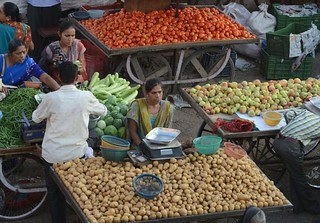
PREV ARTICLE
NEXT ARTICLE
FULL ISSUE
PREV FULL ISSUE
CRISIS NUDGES INDIA'S VENDORS AWAY FROM CASHDick Hanscom writes: India's currency crisis has been covered everyplace. This is a BBC article that has links within it to other facets of the problem. Thanks. The article focuses on the movement away from cash, which has been underway worldwide, but crises like this accelerate. The
links reference related articles on topics like how India will destroy all the obsolete banknotes, and the secret savings of India's housewives.
-Editor
Within minutes, people were out on the streets - queuing outside ATM machines to withdraw money in lower denominations or rushing to shops to buy provisions. The two banned notes account for 86% of all notes in circulation in India's largely cash economy. "I sold all the vegetables in my stall in 20 minutes. This had never happened before," Mr Gupta told the BBC. But the following day, he did not earn anything. Very few customers turned up and even those who wanted to buy vegetables did not have change to pay him. The situation continued for the next five days where without buyers all his vegetables got spoilt, causing him a loss of over 10,000 rupees ($150;£121) Desperate to earn some money, Mr Gupta turned to popular mobile wallet Paytm, which he had heard about from his friend. Mobile wallets are apps that allow people to load and transfer money electronically using their smartphones. "The situation is better now. I get at least four to five customers a day who use mobile wallets to pay me," he says. Paytm, India's largest mobile payment company, says that it has seen a 700% increase in overall traffic, and a 300% hike in the number of app downloads with daily transactions touching 5 million. Even though India has successfully opened millions of banks accounts over the last two years to get more people into the financial system, a huge portion of the population still has no access to banking services. To read the complete article, see: Wayne Homren, Editor The Numismatic Bibliomania Society is a non-profit organization promoting numismatic literature. See our web site at coinbooks.org. To submit items for publication in The E-Sylum, write to the Editor at this address: whomren@gmail.com To subscribe go to: https://my.binhost.com/lists/listinfo/esylum All Rights Reserved. NBS Home Page Contact the NBS webmaster 
|
